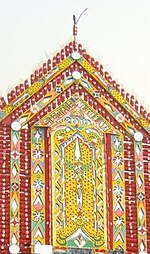Ethnic religions (also "indigenous religions" or "ethnoreligions") are generally defined as religions which are related to a particular ethnic group (ethnoreligious group), and often seen as a defining part of that ethnicity's culture, language, and customs (social norms, conventions, traditions). In an ethnic religion, the ethnic group and its beliefs system cannot be easily separated. Oftentimes an ethnic religion's doctrine only pertains or is directed to that group. A common trait among ethnic religions is that they are closed to outsiders, limiting themselves to members born into the group. This is opposed to universal religions, which are open to all peoples and actively pursue and accept converts.


Africa
editNorth Africa
edit- Ancient Egyptian religion (Ancient Egyptians)
- Berber religion (Berbers of northern Africa)
- Punic religion (Phoenicans of Carthage)
- Coptic Christianity (Coptic Egyptians)
Sub-Saharan Africa
edit- Abwoi religion (Inhabitants of central Nigerian plateau)
- Akan religion (Akans of the Gold Coast)
- Bori religion (Hausa people of Northern Nigeria)
- Dinka religion (Dinka people of South Sudan)
- Dogon religion (Dogon people of Mali)
- Edo traditional religion (Edo people of Edo State)
- Inam (Ibibio people of Southern Nigeria)
- Bantu religion (Bantu of Central/Southern Africa)
- Malagasy religion (People of Madagascar)
- Mbuti religion (Mbuti of Congo and central Sudan)
- Odinani (Igbo of southeastern Nigeria)
- Serer religion (Serer of Senegal and northern West Africa)
- Vodun (Fon and Ewe of Benin and southwestern Nigeria)
- Nuer religion (Nuer people of South Sudan)
- Maasai religion (Maasai people of Kenya)
- Sidama mythology (Sidama people of Ethiopia)
- Waaqeffanna (Oromo people of Ethiopia and Kenya)
- Yoruba religion (Yoruba of southwestern Nigeria and southern Benin)
- San religion (San people of Southern Africa)
Asia
editAustroasiatic
edit- Ka Niam Khasi (Khasis of Meghalaya)
- Muong ethnic religion (Muong people of Vietnam)
- Sarnaism (tribal of India)
- Vietnamese folk religion (Vietnamese)
Austronesian
edit- Aluk Todolo (Torajans)
- Anitism (Indigenous peoples of the Philippines)
- Kaharingan (Dayaks)
- Kan Imam San (Chams)
- Kejawèn (Javanese)
- Malay religion (Malays)
- Marapu (Sumba)
- Parmalim (Bataks)
- Sunda Wiwitan (Sundanese)
- Tolotang (Bugis)
- Tonaas Walian (Minahasans)
Indo-European
edit- Anatolian:
- Hittite religion (Hittites of Anatolia)
- Luwian religion (Luwians of Anatolia)
- Lydian religion (Lydians)
- Baltic:
- Indo-Aryan:
- Kalash religion (Kalash people of Kalasha Valleys in Pakistan)
- Sikhism (among Sikhs in Indian subcontinent and across the world through Sikh diaspora)
- Iranian religions:
- Assianism / Uatsdin (Ossetians)
- Scythian religion (Scythians)
- Shabakism (Shabaks in Iraq)
- Zoroastrianism (Iranian peoples of Achaemenid Empire, Parthian Empire and Sasanian Empire
- Yarsanism (Kurds of northern Iraq and western Iran)
- Yazidism
- Other:
- Phrygian religion (Phrygians of Anatolia)
Semitic
edit- Alawites (Alawis of Syria)
- Druze[1][2]
- Ebla religion (Eblaites)
- Judaism (Jewish people)
- Mandaeism (Mandaeans of southern Mesopotamia)
- Maronite Christianity (Maronites of Lebanon)
- Samaritanism (Samaritans)
- Yahwism (ancient Israelites)
Sino-Tibetan
edit- Sinitic:
- Tibeto-Burman:
- Bathouism (Boro people of India)
- Bimoism (Yi people)
- Bon (Tibetans)
- Burmese folk religion (Bamar people)
- Dongba (Nakhi from the foothills of the Himalayas)
- Donyi-Polo (Arunachali of northeastern India)
- Kirat Mundhum (Kirat of the south-western flanks of the Himalayas)
- Mizo religion (Mizo people of Mizoram)
- Qiang folk religion (Qiang people)
- Sanamahism (Meitei of northeastern India)
Other
edit- Ainu religion (Ainu people)
- Japonic:
- Ryukyuan religion, Ijun (Ryukyuans of the Ryukyu Islands near Taiwan)
- Shinto (Japanese)
- Korean shamanism or Mu-ism (Koreans)
- Koyapunem (Gondi people)
- Tai folk religion (Tai peoples of Mainland Southeast Asia)
- Ahom religion (Ahom people of north-east India)
- Moism (Zhuang people)
- Siberian Shamanism (Indigenous peoples of Siberia)
- Tengrism (Turkic peoples and Mongolic peoples)
Historical Religions
edit- Dravidian folk religion (Dravidian peoples)
- Ancient Mesopotamian religion (Assyria, Sumer, Babylonia and Akkad)
- Elam religion (Elamites)
- Hattian religion (Hattians of Anatolia)
- Hurrian religion (Hurrians)
Americas
edit- Acoma Pueblo religion (Puebloans)
- Anishinaabe traditional beliefs (Anishinaabe)
- Aztec religion (Aztec people of the Aztec Empire)
- Blackfoot religion (Blackfoot Confederacy)
- Brujeria (Latin Americans/Mestizos)
- Candomblé (Afro-Brazilians)
- Cherokee religion (Cherokee people of Cherokee Nation)
- Choctaw religion (Choctaw people of the Choctaw Nation, part of the United States)
- Guarani religion, San La Muerte worship in Paraguay and north of Argentina
- Haitian Vodou (Haitian people)
- Hoodoo (African Americans)
- Inca Religion (Inhabitants of the Inca Empire)
- Inuit religion (Inuit of North America and Greenland)
- Iroquois religion (Inhabitants of the Iroquois confederacy)
- Lakota religion (Lakota people)
- Mapuche religion (Mapuche people of Chile)
- Maya religion (Maya; Guatemalans)
- Miskito religion (Miskito people of Central America)
- Molokane, Spiritual Christians from Russia
- Muisca religion (Muisca people and Colombian Mestizos)
- Muzo religion Muzo people
- Navajo religion (Navajo people)
- Obeah (Afro-Caribbean people)
- Olmec religion (Olmecs)
- Purépecha religion (Purépecha people of the Purépecha Empire)
- Rastafari (Jamaicans)
- Umbanda (Afro-Brazilians and Afro-Uruguayans)
- Santa Muerte worship (Mestizo/Mexicans and Mexican-Americans)
- Southeastern Ceremonial Complex (Mississippian culture)
- Taíno religion (Taíno)
- Tecumseh's religion (Inhabitants of the Tecumseh's confederacy)
- Teotihuacan religion (Inhabitants of Teotihuacan)
- Totonac religion (Totonac people)
- Powhatan religion (Powhatan people)
- Wayuu religion (Wayuu people)
- Yupik religion (Yupik of Alaska and Eastern Russia)
- Zapotec religion (Zapotec peoples of the Zapotec civilisation)
Europe
edit- Albanian religion (Albanians)
- Anglo-Saxon paganism (Anglo-Saxons of England)
- Armenian paganism (Armenians)
- Baltic paganism (Lithuanians, Latvians and Baltic Prussians)
- Basque religion (Basques of the western end of the Pyrenees)
- Celtic paganism (Celtic peoples and tribes (Ancient Britons, Cumbrians, Gaels, Manx, Picts, Gallaeci, Gauls, Belgae, etc.) of what is now Great Britain, Ireland, France, Belgium, Iberia, Asia Minor, and other parts of Europe)
- Circassian paganism (Circassians of Circassia)
- Dacian religion (Dacians of Dacia)
- Georgian religion (pre-Christian Colchis of the southern Caucasus)
- Estonian religion (Estonians of Estonia)
- Etruscan religion (Etruscans of the central Italian peninsula)
- Finnish paganism (Finns and Karelians)
- Germanic paganism (Germanic peoples and tribes of Germania)
- Greek polytheism (pre-Christian Greeks)
- Illyrian religion (Illyrians of Illyria)
- Mari religion (Mari people)
- Minoan religion (Minoan civilization)
- Mordvin Native Religion (Mordvins of Mordovia)
- Norse religion (Norsemen and Vikings of Scandinavia)
- Roman polytheism (pre-Christian Romans of the Roman Empire)
- Sámi religion (Sami people of Fennoscandia)
- Samnite religion (Samnites of Samnium)
- Slavic paganism (Early Slavs/Slavs) of Eastern and Southeastern Europe)
- Tengrism (Turks)
- Thracian religion (Thracians of Odrysian kingdom)
- Vainakh religion (Nakhs of the Caucasus)
Oceania
editSee also
editReferences
edit- ^ Chatty, Dawn (2010-03-15). Displacement and Dispossession in the Modern Middle East. Cambridge University Press. ISBN 978-0-521-81792-9.
- ^ Simon Harrison (2006). Fracturing Resemblances: Identity and Mimetic Conflict in Melanesia and the West. Berghahn Books. pp. 121–. ISBN 978-1-57181-680-1.